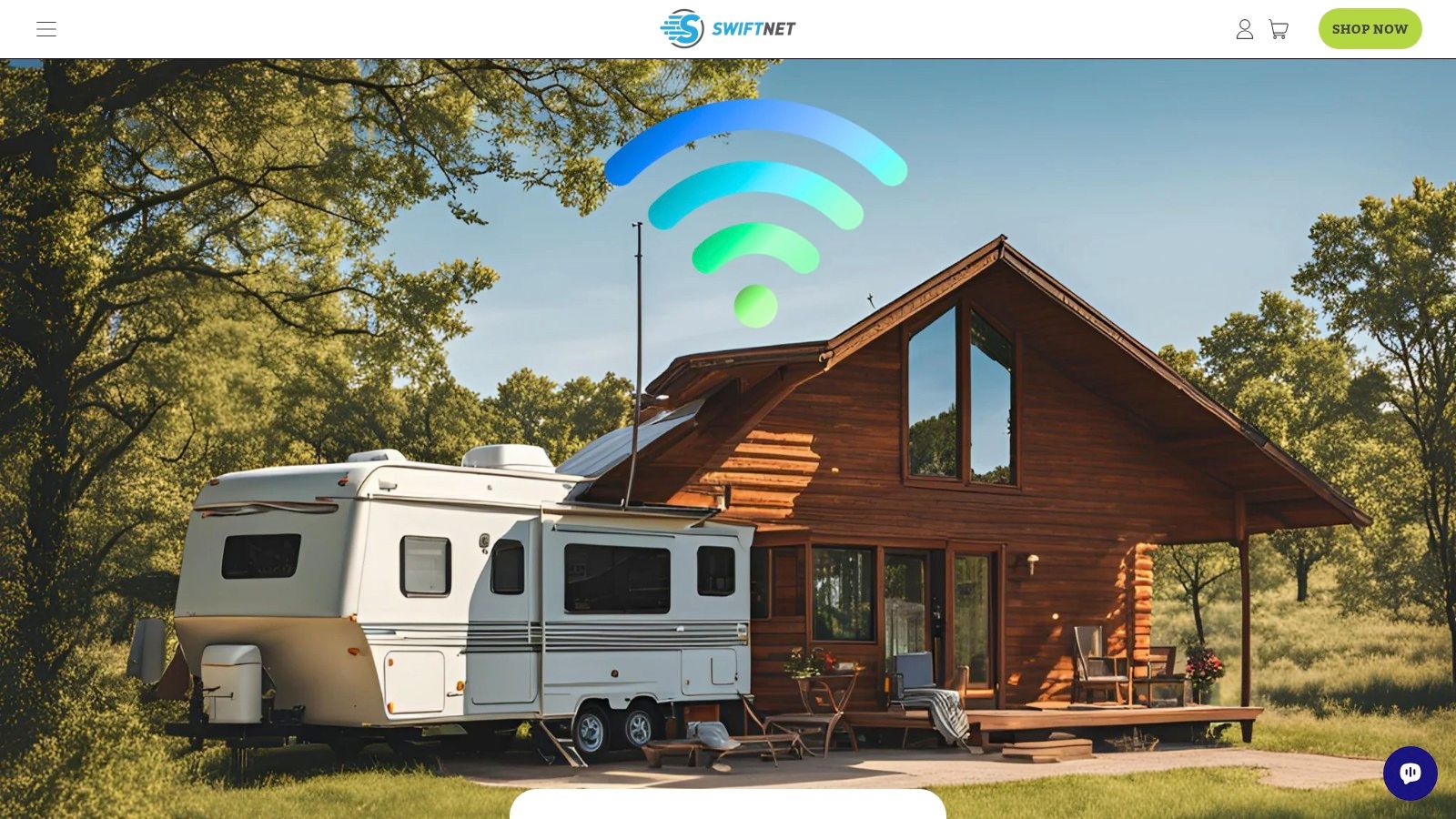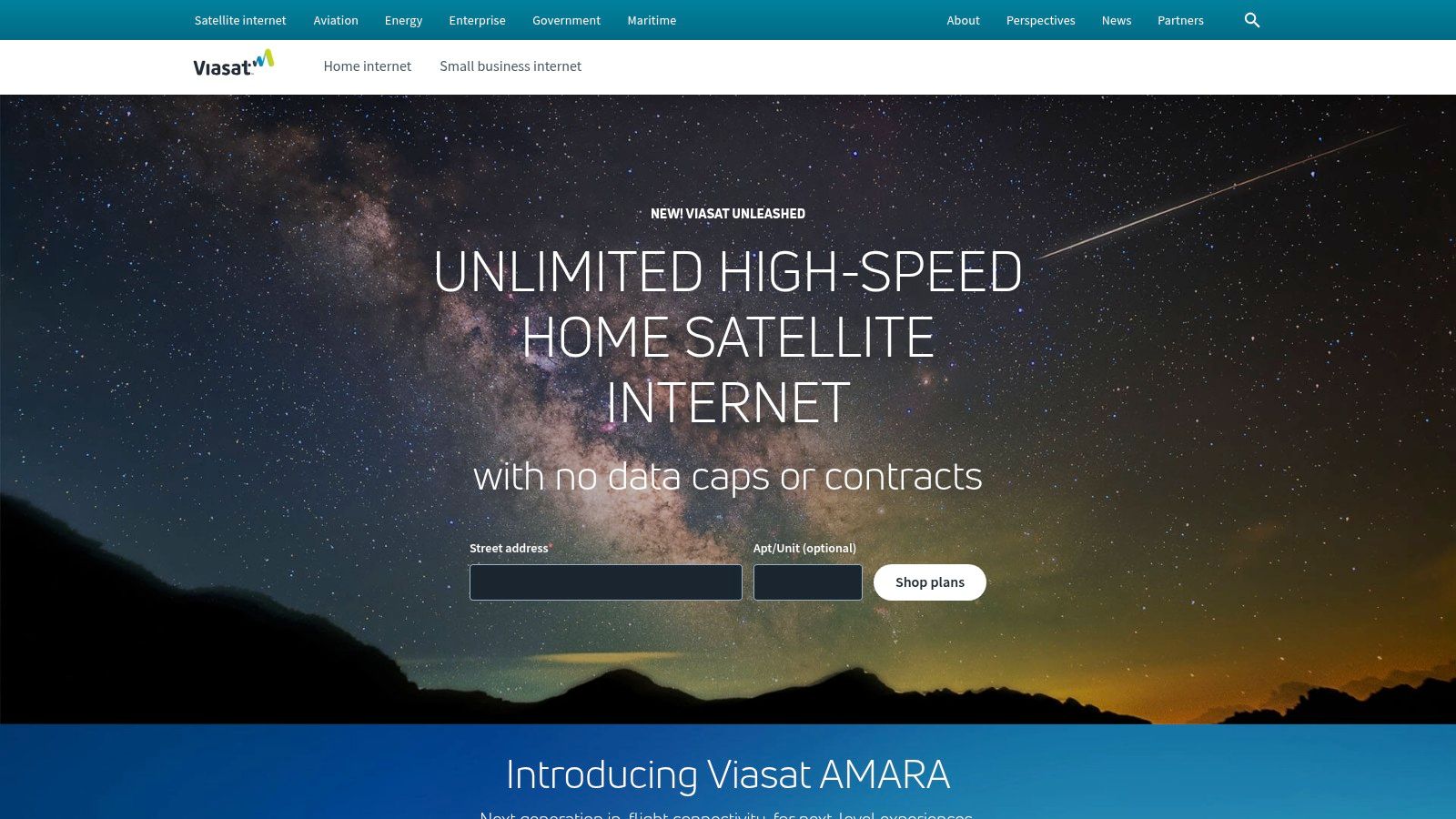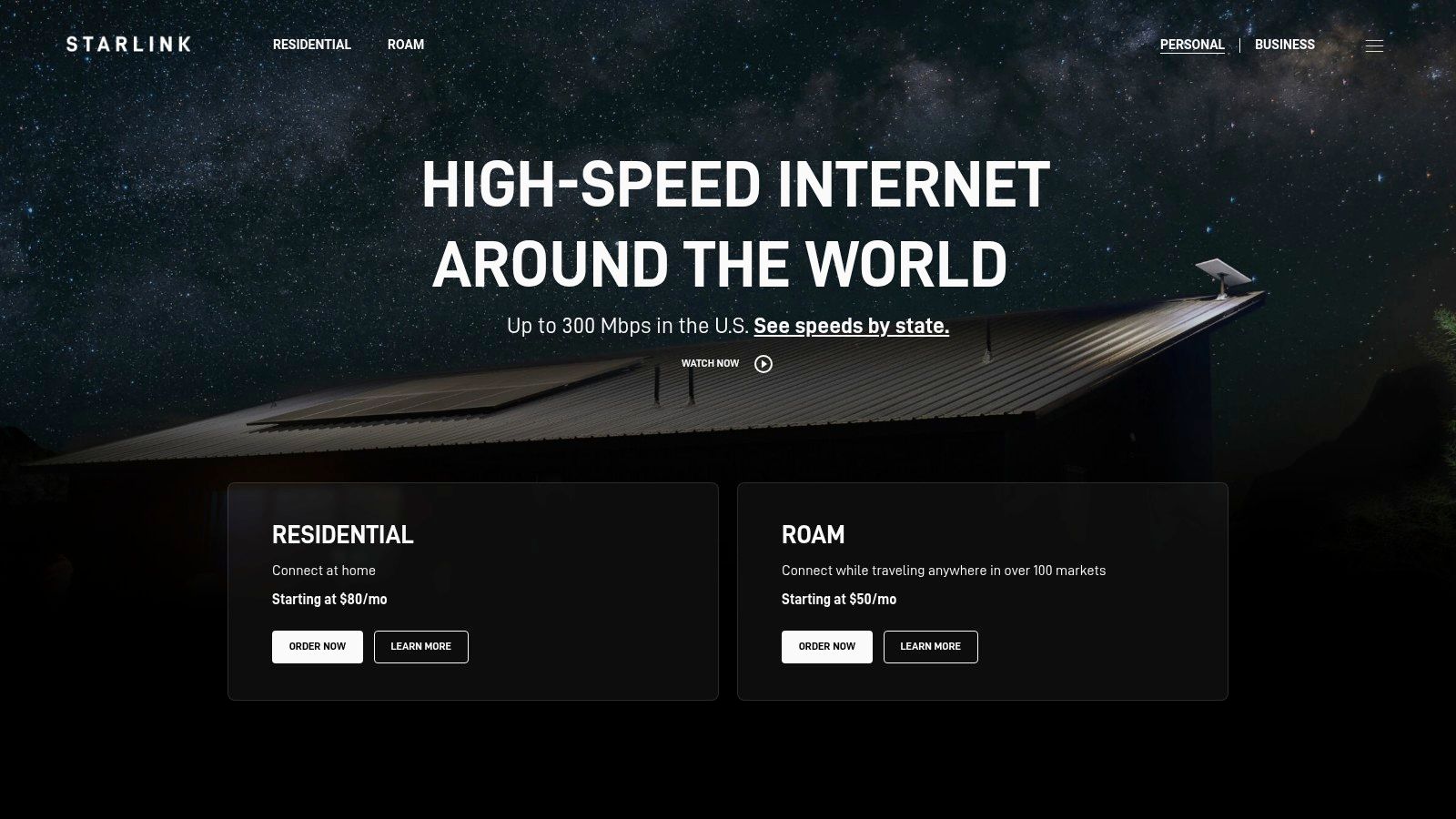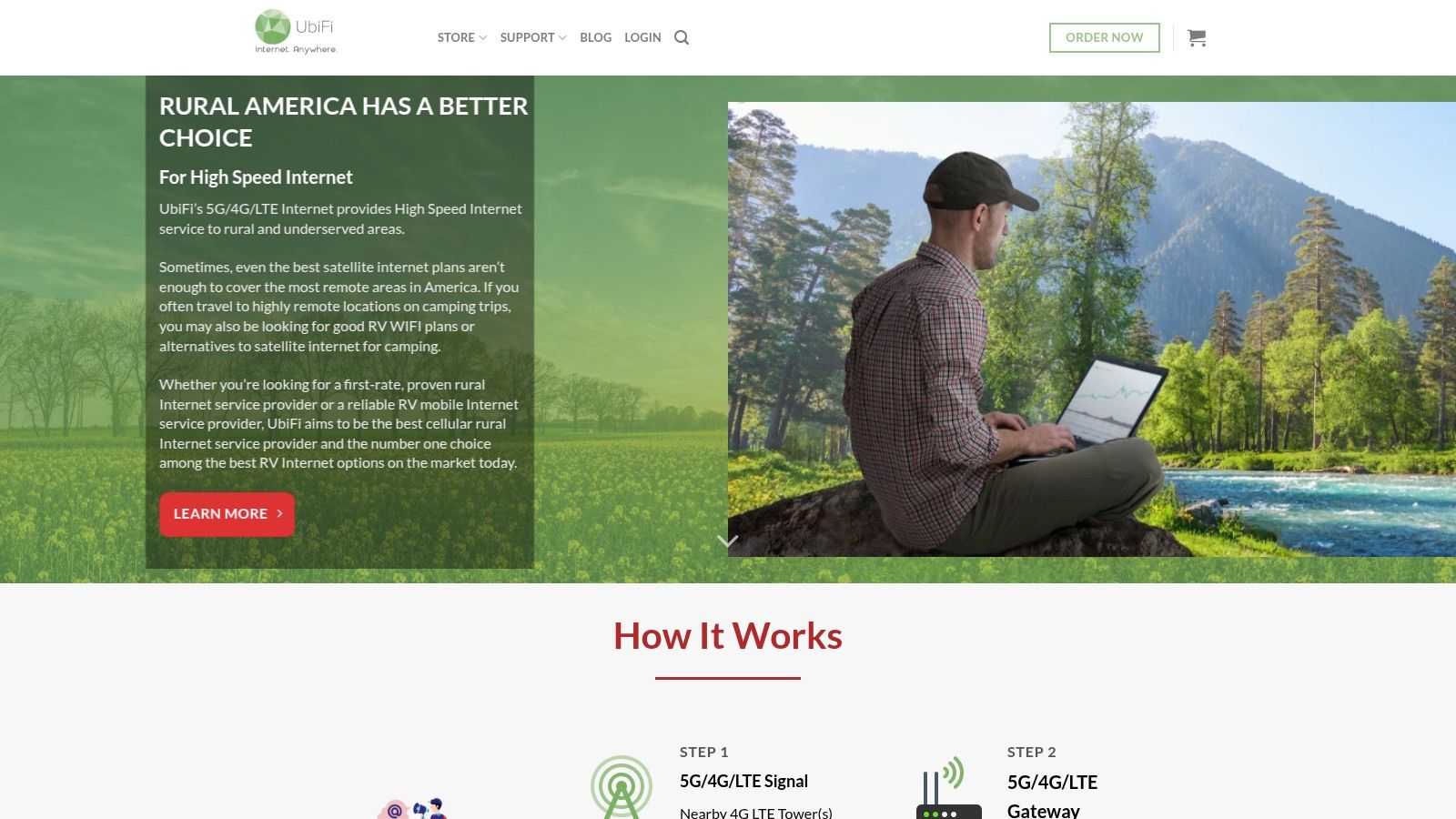
8 Rural Wifi Options for 2025: Fast, Reliable Internet
Posted by James on
Connecting the Countryside: Your Guide to Rural Wifi
Struggling to find reliable rural wifi options? This article lists eight internet solutions for rural homes, RVs, and businesses, comparing speed, reliability, and cost. Discover which option best suits your needs, from established satellite providers like Viasat and HughesNet to newer entrants like Starlink and T-Mobile Home Internet. We'll also cover fixed wireless options like AT&T and Rise Broadband and portable solutions like Ubifi. Learn why SwiftNet Wifi stands out as a top choice for staying connected in the countryside and bypasses the limitations of other providers. Get connected now!
1. SwiftNet Wifi
SwiftNet Wifi offers a compelling solution for those seeking high-speed 5G internet access in rural locations and on the go, particularly for RV travelers. For those living outside the reach of fiber optic internet or working remotely from rural areas, reliable internet is crucial. SwiftNet Wifi aims to fill this gap by offering a dedicated 5G internet service tailored to these specific needs. This makes it a prominent contender amongst rural wifi options, especially for those who require portability.

While many rural internet providers rely on older technologies like DSL or satellite, SwiftNet Wifi's focus on 5G offers the potential for significantly faster speeds and lower latency. This is a key advantage for those who rely on the internet for work, streaming, or gaming. For RV owners and travelers who work online remotely, having a reliable and portable internet connection is essential. SwiftNet Wifi’s 5G service is designed with this mobility in mind, allowing users to stay connected even while changing locations. Learn more about SwiftNet Wifi. This focus on mobility and cutting-edge technology sets SwiftNet Wifi apart. Some alternative solutions may offer similar services, however, often these competitors are hampered by data caps, slower speeds, or unreliable connections, especially in remote areas.
Specific features, pricing, and technical requirements are not readily available on the SwiftNet Wifi website at the time of writing. However, their focus on 5G technology suggests users can anticipate speeds and data allowances more generous than traditional satellite or DSL options. Implementation and setup information will likely vary depending on the specific hardware and service plan chosen by the customer. Contacting SwiftNet directly would be recommended to ascertain precise details related to these aspects. It is worth noting that the value of SwiftNet Wifi lies in its specialization for rural connectivity and mobility. This targeted approach allows them to concentrate resources on providing the best possible service for this specific demographic.
Unfortunately, a distinct list of pros and cons is not explicitly stated on the SwiftNet Wifi website at present. However, one can deduce several potential benefits based on their emphasis on 5G technology. The likely advantages would include faster speeds and lower latency than alternative rural internet options. Portability for RV travelers is also a significant plus. Potential drawbacks could include the availability of 5G coverage in extremely remote areas and the cost of the service, which may be higher than some less-capable alternatives.
Despite the lack of readily available details, SwiftNet Wifi warrants its place in this list due to its commitment to offering 5G internet specifically for rural areas and RV travelers. This focus, coupled with the potential for high-speed connections and portability, positions SwiftNet Wifi as a compelling option for those seeking reliable internet access beyond the reach of traditional wired services. You can visit their website at https://swiftnetwifi.com for more information.
2. Viasat (formerly Exede)
Viasat is a prominent satellite internet provider catering specifically to rural areas across the United States. For those living off the grid, working remotely from a rural location, or even enjoying the RV lifestyle, Viasat offers a viable option for accessing high-speed internet without relying on traditional infrastructure like cable or fiber. This makes it a worthy contender for anyone seeking reliable rural wifi options. Their technology beams internet access directly to your location via satellite, bypassing the need for ground-laid connections. This is particularly appealing in remote locations where other internet service providers simply cannot reach. Viasat's latest service offers download speeds up to 100 Mbps in select areas, making activities like video streaming, online gaming, and general internet browsing possible even in the countryside.

Viasat’s key advantage lies in its extensive availability. Virtually anyone with a clear view of the southern sky can access their service. This broad coverage is a game-changer for rural residents and RV travelers who often find themselves beyond the reach of traditional internet services. Data plans range from 40 GB to 300 GB per month, allowing you to select a plan that aligns with your usage needs. Professional installation is included with most plans, ensuring your equipment is set up correctly for optimal performance. The included WiFi router simplifies the connection process further, allowing you to get online quickly.
Features and Benefits:
- Availability: Reaches nearly every location with a clear view of the southern sky. This is crucial for those in truly remote locations.
- Speed: Download speeds up to 100 Mbps in select areas provide a significantly faster experience than many rural DSL connections, allowing for bandwidth-intensive activities.
- No Phone Line Required: Unlike DSL, Viasat operates independently of phone lines, further expanding its reach.
- 24/7 Technical Support: Provides around-the-clock assistance for any technical issues that may arise.
- Built-in WiFi Router: Simplifies the setup process and eliminates the need for purchasing separate equipment.
Pros:
- Wide availability makes it an excellent choice for rural wifi options.
- Faster speeds compared to other rural internet options like DSL.
- No phone line dependency.
- Continuous technical support.
Cons:
- Higher latency (600-800ms) can make real-time applications like video conferencing and online gaming more challenging.
- Data caps and potential throttling after exceeding the monthly allowance require careful monitoring of usage.
- Higher cost ($50-$150/month) than urban internet options should be factored into your budget.
- Weather conditions can occasionally affect connection quality.
Implementation Tips:
- Check for Obstructions: Ensure a clear, unobstructed view of the southern sky for optimal satellite signal reception. Trees and buildings can significantly impact performance.
- Monitor Data Usage: Keep track of your monthly data consumption to avoid exceeding your plan's allowance and incurring overage charges or experiencing throttled speeds.
- Consider Your Usage Needs: Choose a data plan that accommodates your anticipated internet usage. If you stream a lot of video or engage in online gaming, opt for a larger data allowance.
Viasat provides a much-needed service for those seeking rural wifi options. While it has limitations regarding latency and data caps, its widespread availability and relatively high speeds make it a compelling option for those in remote areas where other choices are limited or non-existent. For more information and to check availability in your area, visit their website: https://www.viasat.com/
3. HughesNet
HughesNet is a prominent player in the rural wifi options landscape, offering satellite internet access specifically designed for those in remote locations across the US, including Alaska and Puerto Rico, and even reaching parts of Central and South America. This makes it a viable option for those seeking connectivity beyond the reach of traditional wired internet providers. Unlike terrestrial internet services that rely on physical cables, HughesNet utilizes satellites, ensuring consistent performance regardless of how far you are from urban centers. This satellite-based approach makes HughesNet a reliable rural wifi option, particularly for those living off-the-grid or constantly on the move, such as RV travelers and remote workers. This reliability is especially important for those who depend on the internet for their livelihood.

All HughesNet plans deliver consistent download speeds of 25 Mbps. The primary differentiator between their offerings is the amount of high-speed data you receive each month, ranging from 15 GB to 75 GB, before speeds are throttled. HughesNet also offers a "Bonus Zone" with 50 GB of additional data during off-peak hours (2am-8am), a feature potentially useful for those who can schedule large downloads or uploads overnight. This can be particularly beneficial for RV travelers who may be parked overnight and able to take advantage of these bonus hours. HughesNet includes built-in WiFi in their equipment and offers an optional WiFi Booster for improved coverage within your home or RV. Importantly, while speeds are reduced to 1-3 Mbps after your monthly data allowance, there are no hard data caps, meaning you'll still have access to the internet, albeit at a slower speed. For those interested in learning more about HughesNet and exploring its suitability, you can learn more about HughesNet.
HughesNet's wide availability makes it a potential solution for those in areas where other rural wifi options are limited. It requires no landline or cellular service, offering a standalone internet solution. They also offer a two-year price lock guarantee, providing budget predictability. However, potential users should consider the drawbacks. The technology inherent in satellite internet results in higher latency (500-700ms) which can negatively impact activities like online gaming and video calls. HughesNet's pricing ($64.99-$149.99/month) tends to be higher than urban internet options, and the significant speed reduction after exceeding the monthly data allowance can be frustrating. Finally, a two-year contract is required, and early termination fees apply. While alternatives like Starlink are emerging, comparing options carefully, considering your specific needs and location, is crucial. While we strive to offer a comprehensive solution at SwiftNet, understanding the strengths and weaknesses of various rural internet providers empowers you to make the best decision for your connection needs.
4. Starlink
For those seeking reliable high-speed internet in rural locations, Starlink emerges as a compelling option. This satellite internet constellation from SpaceX tackles the challenges of limited connectivity in remote areas by leveraging a network of low Earth orbit (LEO) satellites. This approach distinguishes Starlink from traditional satellite internet, offering significantly faster speeds and lower latency – a game-changer for those accustomed to sluggish rural internet alternatives. This makes it a viable choice for RV travelers, rural homeowners, and remote workers who require consistent online access.

Starlink boasts download speeds between 50-200 Mbps in most locations, eclipsing the performance of many other rural internet options. Its low latency of 20-40ms is a significant advantage over traditional geostationary satellite internet, making activities like video conferencing and online gaming far more responsive. The service also offers unlimited data with no hard caps, a welcome feature for heavy internet users. While some competitors may advertise "unlimited" data, they often throttle speeds after a certain threshold, impacting performance. Starlink's commitment to truly unlimited data sets it apart. The self-installation process, facilitated by the included equipment, simplifies setup. Plus, portability features cater to RV owners and those with mobile applications, enabling internet access on the go. This flexible approach to connectivity is particularly attractive to RV travelers and those working remotely from various locations.
The Starlink kit comes with an upfront equipment cost of $599, which is a significant investment. However, considering the performance gains and the potential for increased productivity and entertainment in remote locations, it can be a worthwhile expenditure, particularly when compared to the limited options often available in rural areas. The monthly service fee ranges from $110-$120, which may be higher than some other rural internet options. While some competitors might offer lower monthly prices, it's important to weigh the cost against the benefits of consistent high-speed internet and unlimited data that Starlink provides. It’s about finding the right balance of cost and performance for your specific needs.
Service quality with Starlink can fluctuate based on location and network congestion. Users might also experience brief outages during satellite transitions. However, the continuous expansion of the Starlink network and ongoing technological improvements aim to mitigate these issues and enhance service reliability.
For setup, simply follow the instructions provided with the Starlink kit. Positioning the dish for optimal satellite reception is key to maximizing performance. The Starlink app provides guidance during this process.
Starlink earns its place on this list due to its ability to deliver high-speed, low-latency internet to areas where other options falter. Its consistent speeds, unlimited data, and portability features are particularly valuable for rural residents, remote workers, and RV travelers who prioritize reliable connectivity. While the upfront and monthly costs are factors to consider, the advantages Starlink offers for overcoming the digital divide in rural communities are substantial. You can explore further details and sign up for the service at https://www.starlink.com/.
5. T-Mobile Home Internet
For those seeking reliable rural wifi options, T-Mobile Home Internet presents a compelling solution, particularly for those living outside the reach of fiber optic connections. Leveraging T-Mobile's growing 4G LTE and 5G cellular networks, this fixed wireless service offers a practical alternative to traditional wired internet, making it an ideal choice for RV travelers, RV owners, remote workers, and residents of rural areas.
T-Mobile Home Internet bypasses the need for cumbersome wired infrastructure by utilizing a wireless gateway that connects to nearby T-Mobile cellular towers. This "plug-and-play" system simplifies setup, allowing users to quickly establish an internet connection. As T-Mobile continues expanding its 5G network, the availability of this service in rural communities is steadily increasing.
How Does it Work for Rural Needs?
This service shines in areas where traditional internet options fall short. Imagine working remotely from your RV parked amidst breathtaking scenery, or finally having a stable connection in a rural home previously limited to slow, expensive satellite internet. T-Mobile Home Internet strives to fill this gap, providing connectivity where other options might be unavailable or impractical. Its simple self-installation makes it particularly attractive for those who value convenience and aren't tech-savvy. You receive the gateway, plug it in, and follow the straightforward instructions.
Technical Specifications and Pricing:
- Speed: Expect download speeds typically ranging from 35-115 Mbps on 4G LTE/5G. While this can fluctuate based on network conditions, it’s generally sufficient for streaming, video conferencing, and online gaming.
- Data: A standout feature is truly unlimited data. Say goodbye to data caps and throttling – a significant advantage over many other rural internet solutions.
- Contracts and Fees: Enjoy the flexibility of no annual contracts or equipment rental fees. The flat-rate pricing, typically $50-$60/month with autopay, covers the equipment, service, and taxes.
- Latency: Experience lower latency (20-80ms) than satellite internet, making it more responsive for activities like online gaming and video calls.
Pros:
- Affordable flat-rate pricing: The transparent pricing model eliminates surprises.
- No data caps or overage charges: Use the internet freely without worrying about exceeding limits.
- No equipment fees or long-term contracts: Maintain flexibility and control over your service.
- Lower latency than satellite internet: Enjoy a more responsive online experience.
Cons:
- Limited availability: Service depends on tower capacity and signal strength, which can be a constraint in the most remote areas.
- Performance variations: Network congestion and distance from towers can affect speeds and stability.
- Optimal device placement: Finding the right spot in your home for the gateway is crucial for maximizing performance.
Why Choose T-Mobile Home Internet for Rural Connectivity?
T-Mobile Home Internet earns its place on this list by offering a practical and increasingly accessible solution for rural wifi needs. It stands out with its straightforward pricing, unlimited data, and ease of installation. While availability and performance can vary depending on location, the combination of affordability and convenience makes it a strong contender among rural wifi options. If you're seeking a reliable connection outside the reach of traditional wired services, T-Mobile Home Internet is definitely worth exploring. Visit their website for more details: https://www.t-mobile.com/home-internet
6. AT&T Fixed Wireless
For those seeking reliable rural wifi options, AT&T Fixed Wireless presents a viable solution, especially in areas underserved by traditional wired broadband. Leveraging AT&T's expansive cellular network, this service offers internet access where other options, like fiber optics, might be unavailable. This makes it particularly appealing to RV travelers, RV owners, and those living and working remotely in rural areas.
AT&T Fixed Wireless works by installing an outdoor antenna on your property. This antenna connects to a nearby AT&T cellular tower, bypassing the need for wired infrastructure. This is a key advantage for those in remote locations. AT&T's ongoing expansion of this service reflects their commitment to bridging the digital divide, making it an increasingly accessible option for rural internet users. Learn more about AT&T Fixed Wireless This can be a valuable resource when researching different rural internet providers and comparing them with alternatives like SwiftNet.
Features and Benefits:
- Speeds: Offers download speeds up to 25 Mbps and upload speeds up to 1 Mbps. While these speeds may not match those of fiber optic connections, they are sufficient for many online activities, including web browsing, email, and video streaming. However, for users with more demanding bandwidth needs, exploring options such as SwiftNet might provide a more robust solution.
- Data Allowance: Includes a 350GB monthly data allowance. This is a crucial consideration for heavy internet users. Be mindful of the overage charges ($10/50GB) if you exceed this limit. Evaluating your data usage patterns beforehand can help you avoid unexpected costs.
- Professional Installation: Includes professional installation of the outdoor antenna and indoor Wi-Fi gateway. This ensures optimal signal placement and minimizes the hassle of setting up the system yourself.
- Network Management: Compatible with the AT&T Smart Home Manager app, providing convenient control and monitoring of your network.
- Bundling Options: Offers bundling options with AT&T wireless phone plans, potentially leading to cost savings.
Pros:
- Reliability: More reliable than satellite internet in adverse weather conditions. This is a significant advantage for those in areas prone to rain or snow.
- Lower Latency: Offers lower latency (30-100ms) compared to traditional satellite internet, resulting in a more responsive online experience. This is important for activities like online gaming and video conferencing.
- Availability: Available in numerous rural areas where other options are scarce. This makes it a valuable solution for those who might otherwise be without internet access.
- Professional Installation: Ensures optimal signal placement for the best possible performance.
Cons:
- Overage Charges: $10/50GB overage fees after exceeding the 350GB monthly data allowance. This can become costly for users with high data demands.
- Speed Limitations: Speeds may be slower than other available options, particularly when compared to fiber or some fixed wireless competitors like SwiftNet. If speed is a critical factor for your internet usage, consider exploring alternative providers.
- Limited Availability: Availability depends on proximity to AT&T towers, which can be a limiting factor in some rural locations.
- Installation Fee: A $99 installation fee may apply without promotions. Be sure to inquire about any ongoing promotions to potentially waive this fee.
Website: https://www.att.com/internet/fixed-wireless/
AT&T Fixed Wireless deserves its place on this list due to its targeted focus on serving rural communities. While it may not offer the fastest speeds or unlimited data, its availability in underserved areas and reliability compared to satellite internet makes it a valuable rural wifi option. However, always compare available options in your specific area, considering factors such as speed, data allowance, and cost. Don't hesitate to research providers like SwiftNet, who may offer enhanced performance and features tailored to meet your specific needs.
7. Rise Broadband: A Solid Rural Wifi Option
For those seeking reliable rural wifi options, Rise Broadband emerges as a strong contender, especially for those living in the Midwest and Western United States. This fixed wireless internet service provider bypasses the need for traditional cable or fiber, making it a viable choice for RV travelers, RV owners, remote workers, and anyone residing in rural areas lacking fiber optic internet. Unlike satellite internet, which often suffers from high latency, Rise Broadband offers a more responsive online experience, making it suitable for activities like video conferencing and online gaming.
Rise Broadband delivers internet signals wirelessly from local towers to a receiver installed at your home. This "line-of-sight" technology eliminates the need for digging trenches or stringing cables, a significant advantage for those in remote locations. With plans ranging from 25 Mbps to 100 Mbps download speeds and data allowances from 250GB to unlimited, Rise offers a variety of options to fit different needs and budgets. They also provide phone service bundles in many service areas, consolidating your communication needs.
Why Rise Broadband Deserves a Spot on this List:
Rise Broadband distinguishes itself within the rural wifi landscape by offering a compelling blend of performance, affordability, and customer service. Its focus on fixed wireless technology delivers lower latency (typically 10-50ms) compared to satellite internet, a crucial factor for real-time applications. This technology also translates to more affordable pricing, with plans starting around $45/month – a welcome contrast to the often-premium costs of satellite internet. Furthermore, the availability of local customer service in many areas provides a personalized touch often missing with larger, national providers. Finally, the flexibility of no-contract options on many plans offers a level of freedom and control appreciated by many rural internet users.
Features and Benefits:
- Speed and Data Options: Choose from plans offering 25 Mbps to 100 Mbps download speeds and data allowances from 250GB to unlimited. This flexibility allows you to select a plan that aligns with your usage patterns, whether you're a casual browser or a heavy streamer.
- Fixed Wireless Technology: Enjoy the convenience and speed of fixed wireless, eliminating the need for cable or fiber infrastructure. This technology is particularly advantageous in rural settings where traditional infrastructure may be limited or unavailable.
- Phone Bundles: Combine your internet and phone service with available bundles, simplifying your billing and potentially saving you money.
- No Hard Data Throttling: Experience consistent speeds even on unlimited data plans during normal usage, ensuring a reliable connection for your online activities.
Pros:
- Lower Latency: Enjoy a more responsive online experience compared to satellite internet, making video calls, online gaming, and other real-time applications smoother.
- Affordable Pricing: Benefit from competitive pricing starting around $45/month, making high-speed internet more accessible in rural areas.
- Local Customer Service: Access personalized support in many service areas.
- No Contracts (on select plans): Enjoy the flexibility of no-contract options, allowing you to adapt your internet service as needed.
Cons:
- Limited Coverage: While Rise Broadband serves a substantial customer base, its coverage area is less extensive than satellite internet. Check their website to confirm availability in your location.
- Line-of-Sight Requirement: A clear line-of-sight to a transmission tower is necessary for optimal performance. Obstructions like trees or buildings can impact signal quality.
- Installation Fees: Expect installation fees ranging from $99 to $150. This is a common cost with fixed wireless installations.
- Weather Sensitivity: Extreme weather conditions can occasionally affect performance. While this is less of an issue than with satellite internet, it's a factor to consider.
Implementation/Setup Tips:
- Check Availability: Before committing, verify that Rise Broadband services your specific location through their website.
- Assess Line-of-Sight: If possible, identify potential obstructions between your home and the nearest Rise Broadband tower. This will help ensure optimal signal strength.
- Consider Your Data Needs: Choose a data plan that aligns with your typical internet usage to avoid overage charges or throttled speeds.
Website: https://www.risebroadband.com/
By carefully weighing these pros and cons and checking for service availability, you can determine if Rise Broadband is the right rural wifi solution for your needs.
8. Ubifi
Ubifi stands out among rural wifi options by offering unlimited 4G LTE and 5G internet service specifically designed for rural homes and businesses. Unlike traditional internet service providers (ISPs) that often neglect underserved areas, Ubifi leverages existing cellular networks to bring high-speed internet access to the countryside. This makes it a viable option for those seeking reliable internet access in areas where other rural wifi options are limited or unavailable. Its focus on higher data allowances than typical mobile hotspots, combined with compatibility with home internet routers, makes it a practical solution for everyday online activities in rural locations.

Ubifi offers truly unlimited data, a crucial feature for rural users who often lack alternatives and rely heavily on their internet connection for work, entertainment, and communication. With typical speeds ranging from 25-50 Mbps, activities like streaming, video conferencing, and online gaming are possible. The absence of hard data caps ensures consistent connectivity, although speeds may be affected by network congestion during peak hours. This focus on unlimited data makes Ubifi a particularly appealing rural wifi option for those who rely heavily on internet access for work or entertainment.
One of the key advantages of Ubifi is its flexibility. It operates on a month-to-month basis, freeing users from long-term contracts and commitments. This is ideal for RV travelers, those living in rural areas temporarily, or anyone who values the freedom to change providers. The portability of the service is another plus. Because it relies on cellular networks, Ubifi can move with you, providing internet access wherever there’s compatible cellular coverage. This is a distinct advantage for those working remotely or traveling frequently.
Setting up Ubifi requires purchasing a compatible LTE/5G router (typically costing between $200-$500), which provides the functionality of a traditional home internet setup. This one-time cost allows you to connect multiple devices and enjoy a stable Wi-Fi network. Ubifi also offers the option of a static IP address, which can be crucial for certain online activities like hosting a server or accessing specific networks.
While Ubifi presents a compelling solution for rural internet access, potential users should consider the following: Performance relies heavily on the strength and availability of cellular signals from supported carriers in your area. Congestion on local cell towers can also impact speeds. Finally, the monthly cost, ranging from $99-$129, is higher than some other rural internet alternatives. However, for those prioritizing truly unlimited data and the flexibility of a no-contract service, the cost may be justified. For more information, visit the Ubifi website: https://www.ubifi.net/
Rural WiFi Options: 8-Provider Comparison
| Service | Key Features ✨ | User Experience ★ | Ideal For 👥 | Pricing & Value 💰 |
|---|---|---|---|---|
| 🏆 SwiftNet Wifi | 5G high-speed; rural & RV coverage | Consistent & reliable connectivity | Rural residents, RV travelers | Competitive rates, great value |
| Viasat (formerly Exede) | Satellite; up to 100 Mbps; built-in router | Wide coverage with 24/7 support; high latency | Remote users in rural areas | Higher cost ($50-$150/mo), data caps |
| HughesNet | Satellite; fixed 25 Mbps; bonus off-peak data | Stable performance; throttling after cap; contracts | Rural & remote US locations | Price lock, $64.99-$149.99/mo |
| Starlink | LEO satellite; 50-200 Mbps; low latency | Fast speeds; self-install; equipment cost upfront | Global rural areas, RV users | $110-$120/mo plus $599 kit upfront |
| T-Mobile Home Internet | 4G/5G fixed wireless; unlimited data; self-install | Affordable, low latency; variable signal strength | Rural/underserved home users | Flat rate ~$50-$60/mo with no contracts |
| AT&T Fixed Wireless | Outdoor antenna; up to 25 Mbps; bundle options | Reliable in poor weather; professional install | Rural homes/businesses near towers | 350GB cap with overage fees; moderate pricing |
| Rise Broadband | Fixed wireless; 25-100 Mbps; multiple data plans | Low latency; local support; no lengthy contracts | Rural/suburban users (Midwest/West) | Affordable (~$45/mo+ installation fees) |
| Ubifi | Unlimited 4G/5G; works with own router; portable | Flexible month-to-month; variable performance | Rural homes & mobile businesses | ~$99-$129/mo; router purchased separately |
Staying Connected: Choosing the Best Rural Wifi for You
Finding reliable internet in rural areas can be challenging, but with the right tools and information, staying connected is more achievable than ever. This article explored various rural wifi options, including satellite internet providers like Viasat (formerly Exede) and HughesNet, emerging technologies such as Starlink, fixed wireless options like T-Mobile Home Internet and AT&T Fixed Wireless, and specialized providers like Rise Broadband and Ubifi. We also looked at SwiftNet Wifi. While these other options offer varying degrees of service, they often come with limitations in speed, data caps, or reliability, particularly in remote locations.
Choosing the right solution depends on your individual needs. Factors like data usage, budget, and the availability of service in your specific location play a crucial role. For those with high data demands, options like Starlink might seem appealing, but the cost and availability can be prohibitive. Fixed wireless solutions like T-Mobile and AT&T are often geographically limited. Satellite internet, while widely available, can suffer from latency issues.
SwiftNet Wifi stands out by addressing these common rural internet challenges. SwiftNet offers a tailored approach to rural connectivity, focusing on providing reliable and affordable internet services specifically designed for remote areas. While others may promise high speeds, SwiftNet prioritizes consistent performance and customer satisfaction, making it a top contender for those seeking seamless connectivity in 2025 and beyond.
Ready to experience seamless connectivity in your rural location? Discover how SwiftNet Wifi can empower your work and leisure online. Visit SwiftNet Wifi today to explore plans and coverage options and find the perfect solution for your rural internet needs.


















































